- Home
- Michael Thomas Ford
The Road Home Page 5
The Road Home Read online
Page 5
But he did lose it when he left for college two years later. Not because either he or Mars ended it, but because it faded away as they moved further down their respective paths and away from one another. There were occasional returns to the past—Mars spent a weekend with Burke in Boston, attending a U2 concert, and Burke was the best man at Mars’s wedding to Jane—but then Mars became busy with veterinary school and babies, and Burke became busy with his photography and his first lover. Phone calls became e-mails, which became annual holiday cards. Then even those stopped as time, distance, and absence weakened the bonds of friendship.
Burke had not seen Mars in more than fifteen years, since running into him during a Christmas visit home and promising to get together soon. In all the years they’d never discussed Burke’s lack of a girlfriend or wife, and Burke assumed Mars had figured things out on his own. Until seeing Mars in his son’s face, Burke hadn’t thought about what happened between them in a long time.
He closed the door on the past and brought himself back to the present. The eggs on his plate were now an unappetizing scramble; the toast, soggy with butter. Burke picked up a piece of bacon, took one bite, and dropped the strip on top of the eggs. He was no longer hungry. Pushing the tray away, he lay back and closed his eyes. But no matter how hard he tried, he couldn’t get the face of Mars Janks out of his head.
CHAPTER 6
“Your father tells me you’re a history buff.”
Burke closed Watership Down and set it on his lap. He had finished the Merrick novel earlier in the day and, after discovering that his father’s house was not equipped with wireless Internet service and the only phone jacks were in the kitchen and his father’s office, had grudgingly begun reading about the rabbits of the Sandleford warren. To his surprise, he found himself caught up in the story and was slightly annoyed that Lucy was interrupting at a crucial juncture.
“He would like me to be,” he told Lucy, who was standing in the doorway with a large book in her hands. “Actually, I am,” he admitted. “Just not as big a one as he would like.”
Lucy nodded. “I’ve heard about the great schism,” she said, laughing. “Or, as your father puts it, about how you threw away a teaching career for the life of an artist.”
“Never mind that I’ve made a living as a photographer for almost twenty years now,” said Burke. “He still hates it that I’m not standing in front of a bunch of bored, pimple-faced kids, discussing the Trail of Tears.”
Lucy didn’t remark on this statement. Whether this was out of politeness or an unwillingness to get between Burke and his father, Burke was unsure. Instead, she approached the bed and held out the book. “Jerry was a history teacher,” she said. “This was his life’s work.”
Burke took the book and looked at it. “Sons of the Green Mountain Boys: The Vermont Militia in the Civil War,” he read. “By Gerald McHenry Grant. Impressive. I have to admit, when I think of the Civil War, I don’t immediately think about Vermont.”
“Most people don’t,” said Lucy. “Not even most Vermonters. Jerry was always fascinated by the lesser-known aspects of the war. This was the main reason we moved here, so he could do research for the book.”
Burke opened the book and flipped through the pages. It was filled with photographs, maps, and a seemingly endless parade of footnotes. “This is impressive,” he told Lucy. “It must have taken him years.”
Lucy nodded. “He worked on it every chance he got,” she said.
Burke, turning to the front of the book, glanced at the book’s copyright information. “This came out only two years ago,” he said, surprised. “I thought your husband died five—” He stopped, realizing he might have said something insensitive.
“He did,” said Lucy. “I finished it for him. Really it was already done. Jerry was meticulous about his research, and he’d written almost all of the text before his memory got too bad. I just had to pull it all together from the notes he left.” She hesitated a moment before continuing. “He was terrified that he would forget about it before it was finished,” she said. “After all those years of research, he couldn’t bear the thought of the book dying with him. I think it’s what kept him going as long as he did.”
“So he never saw it like this,” Burke remarked, running his hand over one of the pages.
Lucy shook her head. “No. But he knew it was going to be a book, and that’s what mattered to him. I promised him I would do it.”
“You could have let it go,” Burke remarked without thinking. “He never would have known.”
“But I would,” said Lucy. “Besides, it’s a good book. Don’t let all the footnotes fool you. Jerry was mad about footnotes, so I left them in, but you can skip right over them. It won’t make a bit of difference.”
Burke nodded. “I will,” he promised. “Thanks for bringing it up.”
When Lucy was gone, Burke opened the book again. He turned to the introduction and read the first sentence. “The name Ethan Allen is well known to students of early American history and is recognizable also to those who appreciate a well-turned table leg or an elegantly proportioned hutch.”
Burke chuckled at the joke. One of the chief complaints of his history professors at the University of Vermont was that one of the most important figures in the history of the state had been reduced in the minds of the general public to a mascot for a furniture company. It was, as far as they were concerned, yet another slight against their state, which they universally believed to be unappreciated by the larger union. When the state’s tourism bureau held a contest to replace the much-derided “I LoVermont” slogan, the history department only half-jokingly launched a campaign for it to be changed to “We are more than maple sugar.”
He hadn’t thought about that in years. His time at the university had been short. He’d stayed only a year before deciding that teaching history was not his passion. He had discovered photography, thanks to the school’s requirement that all freshmen take one class in the arts, and had immediately known that it was what he wanted to do with his life. His father had been less enthusiastic about his son’s choice, and at first had refused to pay for any further education unless Burke came to his senses. Burke’s mother had played mediator, however, and it was decided that Burke would go to school in Boston to pursue what his father insisted on calling “his new hobby.”
For the next three years, whenever he spoke with his father, Burke had endured the same question: “How’s the picture taking coming along?” Even when his work began receiving awards and being included in gallery shows, Burke’s father had received the news with little enthusiasm, always asking how much Burke was being paid for his work. Eventually Burke had just stopped talking about it altogether, sharing his personal accomplishments with his mother and limiting his discussions with his father to the job he had taken as a staff photographer for a Boston newspaper.
Things had improved over the years. As it became evident that Burke would be able to support himself as a photographer, his father had grudgingly accepted that perhaps his son had not made a foolish choice, after all. But there remained in their relationship an underlying sense of disappointment, which no amount of professional success or personal satisfaction could completely overcome.
He wondered if his father had put Lucy up to giving him the book. Was it his father’s way of pointing out what Burke could have done with his life? He had come up to see Burke only twice since his arrival, and then for only a few minutes at a time. Although Burke sensed no resentment of his being there, now he couldn’t help but question if this was his father’s way of saying, “I told you so. If you had just stuck with history, this never would have happened.” As if Burke’s decision of twenty-two years before was the first in a chain of easily preventable mistakes culminating in the crash that had landed him in his father’s house.
Or, he told himself, maybe Lucy just thought you might be interested in her husband’s book.
He tried not to think about anyone’s motivations
as he read Jerry’s book. This was easier than expected, as he quickly found himself caught up in the story. He knew quite a bit about Allen, the Green Mountain Boys, and their role in both Vermont’s own struggle for independence from New York and in the larger War of Independence. He was much less familiar with the role the Vermont militia played in the Civil War, and he found this fascinating.
He was so engrossed in the book that when the door opened an hour later, he didn’t look up as he said, “This is really good stuff, Lucy.”
“Thanks,” said a male voice. “I did my best.”
Burke looked up. Mars Janks was standing in the doorway to the room. Beside him was the younger version of himself, whom Burke had seen through the window earlier in the day. Burke looked from one to the other. The resemblance was unnerving.
“Hi, Burke,” Mars said, stepping forward and holding out his hand for Burke to take.
Burke was momentarily unsettled by the formality of his old friend’s greeting but accepted Mars’s hand and grasped it warmly. “It’s been a while,” he said.
Mars nodded. “Too long,” he agreed. He turned and motioned his son into the room. “This is my boy, Will,” he said.
Like his father had, Will extended his hand. “Good to meet you,” he said in Mars’s voice.
“Lucy tells me your dad is making you into a vet,” Burke remarked.
“I’m trying to,” said Mars. “He’s got a way with the animals, that’s for sure. Old Jack will do anything for him.”
“I just know how to talk to him, is all,” Will said, his cheeks reddening. “It’s no big deal.”
“Getting that horse to do anything is a big deal,” said Mars. “I swear he’s three-quarters mule.” He pointed at Burke’s leg. “Heard you had yourself an accident,” he said.
“No, I just wanted to spend a couple of months in the country,” Burke joked.
Mars laughed. “Be glad you’re not a horse,” he said. “We’d have to put you down.”
Burke laughed at the poor attempt at a joke. He was trying not to stare at Will. Mars had matured into a handsome man, but looking at Will took Burke right back to high school. Where Mars had grown into himself, Will was still finding his way. His awkwardness reminded Burke of his own at that age. It also reminded him of that night in Mars’s car. He looked away.
“So, is Old Jack going to be all right?” he asked a little too loudly.
“He’ll be fine,” said Mars. “You know how it is. The older you get, the more you have to watch what you eat.”
Burke didn’t bother to laugh this time. He looked at Will and caught him grimacing at his father’s poor attempt at humor. Will in turn saw Burke watching him and gave a lopsided smile, one side of his mouth rising up as he shook his head. Burke felt something in his belly jump at the sight.
“Well, we should be going,” said Mars, oblivious to the joke being shared at his expense. “We’ve got to check on Sam Barton’s ewe. Poor girl’s got mastitis.”
“Sounds painful,” Burke said.
“I’ll come by again soon,” Mars assured Burke. “We can talk about the old days.”
He’s talking as if we’re in our seventies, Burke thought. Like his life is all but over.
“That’s a good book.”
Will’s comment drew Burke’s attention. “This one?” he said, holding up Jerry’s book.
Will nodded. “It’s interesting. I mean, if you’re into Vermont history.”
“Will plays around in one of those reenactment groups,” Mars explained.
“It’s the Eighteenth Vermont Regiment,” Will corrected. “And it’s not a reenactment group, although we do that sometimes. It’s mostly about preserving the history of Vermonters who fought in the Civil War.”
“Sounds interesting,” said Burke. He felt sorry for the young man. Mars clearly didn’t think much of Will’s activities. “Maybe you can help me get up to speed on this. I’m afraid my knowledge of Vermont war history ends with the capture of Fort Ticonderoga.”
“Sure,” Will said, flashing the endearing grin again. “Maybe later this week?”
“I’m not going anywhere,” said Burke, indicating his leg. “I’m a captive audience.”
“Now you’ve done it,” Mars told Burke. “Once he gets started, there’s no shutting him up about this stuff. He’ll talk your ear off if you give him a chance.”
“That’s all right,” Burke replied. “I’ve got two of them. I can afford to lose one.” He looked at Will. “You come by any time you want to.”
After Mars and Will left, Burke was surprised to find that he was exhausted. Had seeing his old friend really been stressful? He hadn’t felt anxious or nervous, or at least hadn’t been aware of it if he had, but now he felt the way he did when he had to make small talk with people he didn’t know.
Then again, Mars really wasn’t the guy he’d known in college. He’d changed somehow, become practical and—it was the only way Burke could think of to describe him—grown up. Burke didn’t know this Mars.
On the other hand, Will was someone he recognized. In him he saw the Mars of twenty-five years ago, the young man with good looks and a devil-may-care attitude. He could imagine riding around in the old Volvo with that Janks boy.
What are you doing? he asked himself. He’s half your age.
“Don’t be ridiculous,” he argued. “It’s not like that. He just seems like a nice kid.”
He tried to get back into the book, but the weariness soon overtook him. Combined with the warmth of the afternoon, the sun coming through the window, and the gentle bleating of the sheep outside, it was impossible to resist. He told himself he would close his eyes for only a few minutes. He didn’t want to sleep the day away and then be up all night.
His resolve lasted all of thirty seconds. Then his breathing slowed, his thoughts dimmed, and he slept.
CHAPTER 7
When he woke up, it was dark. For a moment he couldn’t remember where he was. He had been dreaming about the first day of high school. He couldn’t find his locker, then couldn’t remember the combination when he did find it. When the bell rang, rebuking him for being late to his first class, he’d woken up.
Slowly the room came into view and the anxious feeling dissipated. He hated that dream. It was one he had fairly regularly, usually when he was stressed out about a project. Sometimes it took another form and he was—for reasons that were unclear—back in high school after having already graduated from college. He was looking for the student affairs office so that he could prove that he didn’t belong there, but it was always around another corner or down another hallway, just out of reach.
It’s because you’re in your old room, he told himself as he sat up and turned on the light on his bedside table. It illuminated a plate with a sandwich on it. A note lay beside the plate.
Don’t want to wake you.
Dinner was grilled lake trout. Don’t think it would be good cold, so here’s a sandwich.
Dad
Burke picked up the sandwich and lifted the top piece of bread. It was peanut butter and jelly. Strawberry, by the smell of it. He took a bite and chewed, only to discover that the peanut butter was of the crunchy variety. He forced himself to swallow what was in his mouth, but the rest of the sandwich was returned to the plate.
“Who uses crunchy peanut butter?” he asked the room. “You might as well eat squirrel shit.”
His father should have known he didn’t like crunchy peanut butter. On the rare occasions when Burke’s mother had gone away without them, it had been up to his father to feed them. Usually Burke’s mother had made and frozen enough meals to last the duration of her absence, but occasionally Burke’s father had found defrosting and reheating one of her dishes too taxing, and had resorted to sandwiches. Burke had always requested peanut butter, and it had always been smooth.
“Of course, he probably never even looked at the jar,” Burke mused.
He wasn’t hungry, anyway. But he was awak
e. He looked at the clock. It was 2:26. The air was heavy and still, as if the whole world was holding its breath. He knew he wouldn’t be able to fall asleep, so he reached for Watership Down. He’d always liked reading late at night, anyway. It made the experience feel more like an adventure somehow.
Then he remembered Jerry’s book. Someone—most likely his father—had removed it from the bed and placed it on the bedside table. The sandwich plate was atop it. Burke lifted the plate and slid the book from underneath it. Opening it to where he’d left off, he continued to read.
The majority of the information we have on the private lives of the men who fought in the Civil War comes from the letters they wrote to loved ones back home. Although it seems unlikely given the chaotic nature of life during wartime, the delivery of mail to and from troops on the move was carried out with surprising efficiency. And as recipients on both ends of the exchange more often than not kept the letters they received, there exists a rich store of firsthand accounts of the events of that period.
Equally important, these letters provide a very personal glimpse into lives turned upside down by the division between the states. Often filled with sorrow and joy in equal parts, they were generally written either to bolster the spirits of sons, husbands, and brothers serving the cause far from home or to reassure loved ones anxiously awaiting a soldier’s return that a reunion was surely not far off.
Perhaps most poignant are the letters sent between husbands and wives or between affianced couples. These are often unusually intimate in tone, almost assuredly because the senders never knew if the letter might be the last words spoken to a loved one. Although inarguably romantic in tone, the majority of the letters of this type are remarkably without the sentimentality that characterizes most love letters, as if the ever-present threat of death made it possible to speak plainly what was contained in the heart of the author.

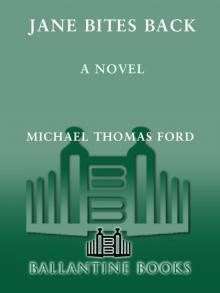 Jane Bites Back
Jane Bites Back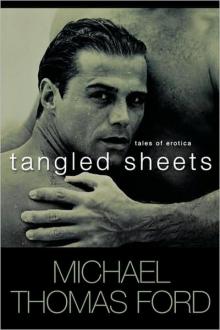 Tangled Sheets
Tangled Sheets Z
Z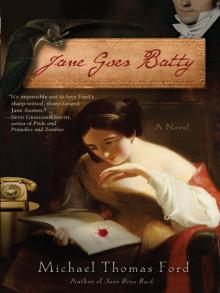 Jane Goes Batty
Jane Goes Batty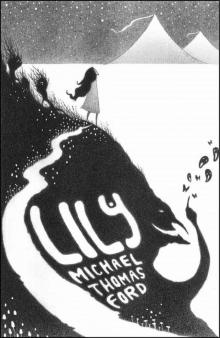 Lily
Lily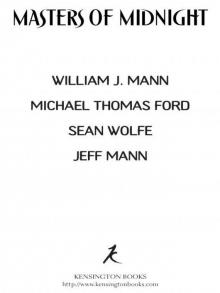 Masters of Midnight: Erotic Tales of the Vampire
Masters of Midnight: Erotic Tales of the Vampire The Road Home
The Road Home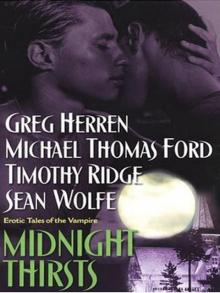 Midnight Thirsts: Erotic Tales of the Vampire
Midnight Thirsts: Erotic Tales of the Vampire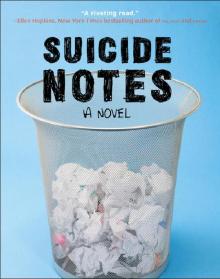 Suicide Notes
Suicide Notes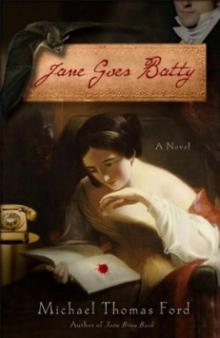 Jane Goes Batty jb-2
Jane Goes Batty jb-2 Jane Vows Vengeance jb-3
Jane Vows Vengeance jb-3 Jane Fairfax 3 - Jane Vows Vengeance
Jane Fairfax 3 - Jane Vows Vengeance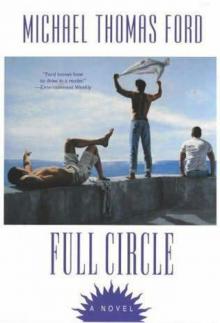 Michael Thomas Ford - Full Circle
Michael Thomas Ford - Full Circle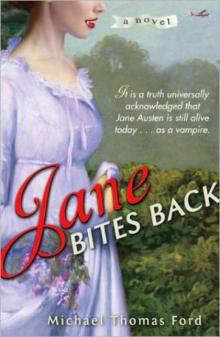 Jane Bites Back jb-1
Jane Bites Back jb-1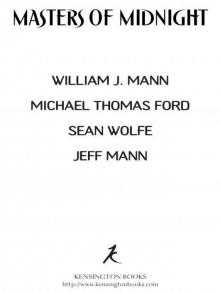 Masters of Midnight
Masters of Midnight